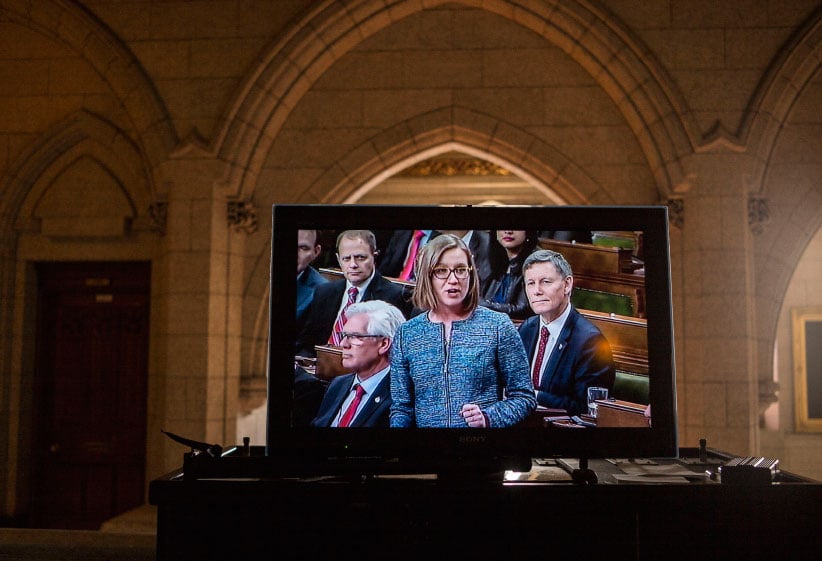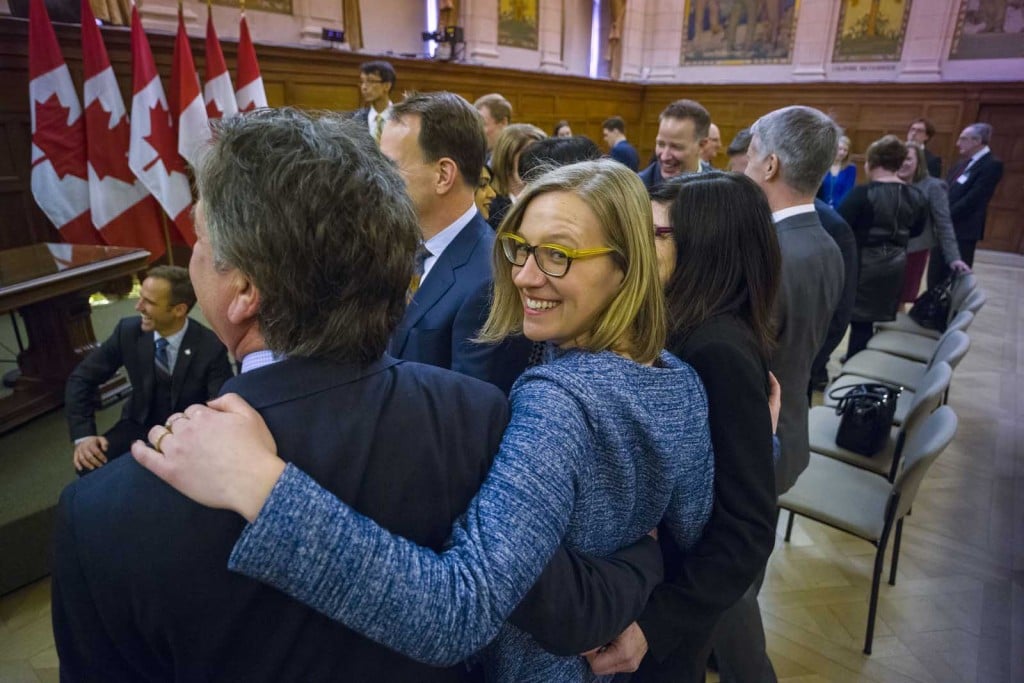Karina Gould’s trial by fire
Ottawa’s young star was under attack from day one of her cabinet job. Just don’t say she was ‘thrown under the bus’ by Trudeau.
TV monitor outside House of Commons during Question Period Minister of Democratic Institutions showing Karina Gould. (Photograph by Peter Bregg)
Share

Karina Gould, minister of democratic institutions, is answering a question about how to draw more women into politics. She’s cautious about using “too big a stick” because the candidate people want should prevail, though she acknowledges that part of the reason she ran in the 2015 federal election is because Justin Trudeau said he wanted more women in the Liberal party.
Then, unprompted, Gould veers into how we need to get rid of the idea that women might be oblivious cannon fodder in certain situations. “We also have to be careful not to say that when a woman is put in a difficult position, that she’s been thrown under the bus,” she says. “She may have been put in that difficult position because she’s capable and able to handle it.”
Well, okay then, let’s talk about that ministerial portfolio.
In Trudeau’s post-Christmas cabinet shuffle, Gould was handed the unenviable task of taking over the fraught Democratic Institutions file from Maryam Monsef. As minister, Monsef fumbled the Liberals’ campaign promise to make 2015 the last first-past-the-post federal election. So on Jan. 10, Gould—a well-spoken and congenial rookie MP—was installed in her place.
READ MORE: Who is Karina Gould, Trudeau’s youngest minister?
What had become obvious by deduction—that the government was ditching electoral reform—was confirmed when the new ministerial mandate letters went public a few weeks later. “A clear preference for a new electoral system, let alone a consensus, has not emerged,” read the Prime Minister’s marching orders to Gould. “Changing the electoral system will not be in your mandate.”
Gould was trotted out to publicly defend that decision on her brand-new file. She has steadfastly refused to say when she became aware of that shift in her portfolio, infuriating electoral reform proponents who met with her the day before the announcement and got no indication the project was dead.
But while she won’t discuss that issue, Gould does speak candidly about others, including jabs about her age (she’s 29) and gender on the campaign trail, and the temporarily dashed dreams of an over-achieving high school student.
She grew up in Burlington, Ont., the riding she now represents, with three younger brothers. “It’s probably how I can handle what’s happening in the House, because I’m used to being heckled,” she says. In high school, she was student council president, on the cheerleading squad and dance team, and involved with the Young Liberals, though she didn’t grow up in a political family.
At 16, Gould participated in the Forum for Young Canadians, a program that brings students to Ottawa for a week to learn about the federal government. She became fixated on a post-graduation plan to end up in Parliament—not as an MP, she clarifies: literally just in the building, somehow. She applied to Carleton University and the House of Commons page program, and made it to the third round of interviews before being eliminated. “I was talking with my mom and crying because I was so devastated that I wasn’t going to be serving the MPs water in the House of Commons,” she says, with gentle self-mockery.
READ MORE: Inside Karina Gould’s first day as a minister on the Hill
Instead, she ended up volunteering at an orphanage in Puebla, Mexico. She speaks of it now as a formative life experience in which she learned to speak Spanish (she speaks fluent French as well) and met her husband, Alberto Gerones. Next, Gould earned a degree in political science and Latin American studies at McGill, then moved to Washington when she took a job with the Organization of American States. After that, she went to the University of Oxford for a master’s degree in international relations.
Gould moved back to Canada in the fall of 2013. She intended to volunteer with the Liberals in Burlington, but gave no thought to actually running until she heard Trudeau speak at the 2014 convention. “I just kind of thought, ‘I could run for him. I really believe in him and I think that I would like to try, because if there’s a time when I would want to be involved with politics, it’s with him as the leader of the party,’ ” she says.
Federally, Burlington had been Conservative for nearly a decade, though in the 2014 Ontario election, Liberal Eleanor McMahon ended 15 years of Progressive Conservative representation at Queen’s Park. Mike Wallace, the incumbent Gould ultimately defeated, says what he heard on doorsteps over and over was that people were simply done with Stephen Harper’s government.
But there’s little doubt that Gould overcame a serious disadvantage. “She started really early because nobody knew who she was,” Wallace says of the ground game she launched the winter before the October 2015 vote. “No offence to her: it’s just the reality of the situation. So she did a great job of just getting out there and trying to at least be known.”

On election night, Gould edged Wallace by 3.5 percentage points, and shortly after, Trudeau named her parliamentary secretary to the minister of international development and La Francophonie. The Liberals made use of her polished speaking skills on the floor of the House to defend the government’s budget, its overhaul of the Canada Pension Plan and even Trudeau’s fawning remembrance of Fidel Castro. “While we recognize the controversy with respect to Mr. Castro, that he was a dictator and that there were and are human rights offences that have happened and continue to happen in Cuba, our commitment as a government, and what Canadians expect of us, is to engage and have that conversation based on real action,” she said.
Gould will not say whether the Prime Minister told her electoral reform was dead in the water when he offered her the cabinet job. “The conversation was very broad, so it was definitely about the key part of my mandate, which was to strengthen and improve and protect Canadian democracy,” she says. Pressed on the point, she demurs: “I can’t talk about cabinet confidence.”
Nathan Cullen, the NDP critic on democratic reform, says he sensed something was awry when he asked to meet with Gould shortly after she was sworn in. He says her office wanted to restrict the meeting to 10 minutes and keep any discussion of her portfolio off the table. When he finally sat down in her office late in the afternoon of Jan. 31, the conversation was all friendly banalities about political life. He pressed Gould on moving forward with electoral reform, but says she offered only vague comments about goals and working together in response. “I said, ‘It feels to me like you guys are trying to find any way to get out of this,” he says. Gould says her meetings with Cullen and other stakeholders were simply intended to be brief meet-and-greets when Parliament resumed.
The day after their meeting, Gould’s mandate letter was published and suspicions were confirmed. In a press conference in the foyer of the House of Commons, Gould betrayed only momentary nerves in her newly prominent and controversial role when she grasped for a French verb and finally settled on a mangled French-English hybrid sentence. When a reporter asked how anyone could trust Liberal election promises if the government is just going to break them, Gould smiled beatifically and thanked her for the question. Responding to a particularly tough or aggressive remark by defusing it with a smiling, bland response is a tic that has stayed with Gould since then.
In the standing committee on procedure and House affairs on March 9, she and Cullen engaged in a tense, protracted exchange, with Cullen demanding to know when she received her mandate letter and knew electoral reform was dead, and Gould repeating like a mantra that the letter was made public on Feb. 1. Gould ended up wearing an awkward smirk and murmuring, “You can ask it many more times,” while Cullen’s eyebrows jumped off his forehead in annoyance and the committee members around him tittered uncomfortably. “He either told her, ‘We want you to kill this thing dead,’ or he didn’t tell her. Both are bad. They’re both reflections on Trudeau,” Cullen says now. “Either she was sitting there in her office with me misleading me, or the government had so little respect for her position that she found out she was breaking the promise an hour or two before the rest of us did.”
Gould speaks articulately and passionately about how people fixate on age and gender when your demographic profile isn’t what they expect in politics, and she seems keenly attuned to and frustrated by the way this maps onto criticism of her file. Elizabeth May—Green Party leader and one of the most vocal supporters of proportional representation—has said, “I am deeply ashamed that our feminist prime minister threw two young women cabinet ministers under the bus on a key election promise.”
Asked if those critiques might be less about patronizing her than they are about frustration with how the government has handled electoral reform, Gould responds, “But would someone say that about a 40-year-old man, or a 65-year-old man?” In fact, the most obvious person Trudeau might have promoted into Gould’s cabinet job was a 40-something man: Mark Holland, who was parliamentary secretary under Monsef and now fills that role for the minister of public safety and emergency preparedness. The potential downside, from the government’s perspective, is that Holland would likely have faced even more barbed questions about the Liberals dropping electoral reform, since he’d been inside the file.

The warped gender standards Gould is pointing out act in other ways, too. What’s known as “the glass cliff” in academia—that women are more likely to land leadership positions when things are rocky, meaning they often face an inherently higher risk of failure—could easily be applied to Gould’s cabinet job. “That’s where you get the feeling that women have had in the past, where they get the assignment that men wouldn’t take because they know it’s damaging,” says Nathan Cullen, the NDP’s democratic reform critic.
Cullen says he’s a feminist, and to him, that means you hold women in high positions responsible for their decisions exactly as you would anyone else. But on a practical political level, he lays the blame for abandoning electoral reform squarely at the feet of the prime minister. “When you write the Wikipedia entry on her and her time as minister, her first task was to break a fundamental promise. And it wasn’t her decision. I suppose that’s why it feels like there’s an element of being used,” he says. “No one believes that Karina Gould sat down and looked at the file, read the report and said, ‘This is bad for Canada.’ ”
But Cullen is baffled that Gould accepted this role, and he holds her solely responsible for that choice. “She seems like a very nice person—very personable, obviously very smart, but is either being used or is allowing herself to be used in the most cynical way,” Cullen says. “And I’m sure no one put a gun to her head to do all this, so I have a hard time understanding how somebody so into politics became so cynical so quickly.”
In person, though, Gould mostly comes across as distinctly un-cynical. She talks about her teenage political nerdery and community involvement with a winking acknowledgment that it can all sound a bit earnest, and she displays an appealing streak of self-deprecation. Where that tone shifts is when she speaks about the ministerial file that has placed her in an awkward spot: a rising star offered the promise and profile of a cabinet job, but tasked from the start with defending an unpopular—if esoteric—decision her boss has since owned as being entirely his.
Asked if she worries that killing off electoral reform could make young voters—who seemed particularly keen on the issue—cynical about politics in general or her party in particular, Gould disputes the idea. “I certainly hope not, and that’s not a narrative I would perpetuate because I think it’s important in a healthy democracy we can agree and disagree on policy without going down that road,” she says. “Because democracy and our system is a battle of ideas. If you feel passionately about something, it’s up to you to ensure that you go out there and you share that with people.” Of course, electoral reform advocates would argue voters did make their views known and believed they were getting a government that would make good on them.
Of her cabinet post and perceptions of it from the outside, Gould argues that “if you’re put in a tough situation, it may not be because they don’t think you can handle it, but precisely because you can.” There’s little doubt she possesses plenty of ability, and she’s going to need it all, because she inherited a portfolio that requires her to dig herself out of a hole before she can start to build up any momentum.